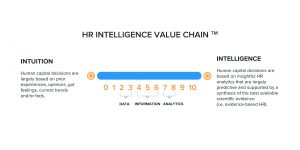Ethical HR Analytics & Workforce Decisions
The topic of “HR intelligence” or what is more popularly and perhaps narrowly referred to as people, talent, human capital, workforce, or HR analytics is one of the hottest trends in business today. Among the mainstream HR community and popular press, HR analytics has been largely described as a newfangled label for “metrics on steroids” (i.e., metrics with the “power to predict” – perhaps) which arguably minimizes the strategic value and impact HR analytics can achieve in terms of improving individual and organizational performance.
At HR Intelligence.Org, we refer to “HR analytics” more broadly as HR intelligence. HR intelligence encompasses the full range of HR research and analytics related practices including workforce surveys and assessments, 360° feedback, metrics and indicators, benchmarking, human capital research, employee and talent profiling, talent forecasting, learning evaluation, and more. After all, not everything we do in HR can nor should be expressed in terms of a simple human capital metric, indicator, or algorithm – whether descriptive, predictive, or prescriptive.
HR intelligence is an on-going cycle of ethically gathering, analyzing, communicating and using insightful HR research and analytics results to help organizations achieve their strategic objectives.
The HR Intelligence Cycle™ is a process involving seven steps.
- Determining stakeholder requirements
- Defining the HR research and analytics agenda
- Identifying Big (and Little) data sources
- Gathering data
- Transforming data
- Communicating and using intelligence results
- Enabling strategy, decision-making, execution, and learning
In short, robust HR intelligence capabilities extend beyond HR metrics. HR intelligence enables human capital decisions that are based on insightful HR analytics which are largely predictive and supported by a synthesis of the best available scientific evidence (i.e., evidence-based HR).

